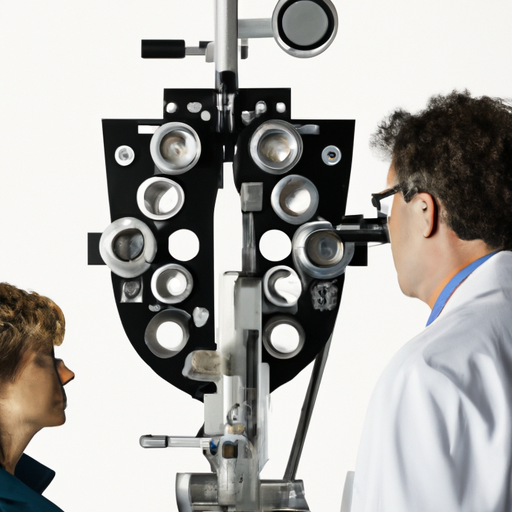Peering into the heart of your health, “Why Are Eye Exams Important” underscores the vitality of routine eye exams and their role in preserving optimal vision. Through the expertise lens of Dr. Joseph Tegenkamp at the renowned Fifty Dollar Eye Guy clinics located at 5328 N Davis Hwy and 6700 N Davis Hwy in Pensacola, Florida, the importance of comprehensive eye examinations is meticulously conveyed. With a commitment to exceptional customer service, personalization of care, and passion for high-quality service, this article illustrates how an eye exam has expansive health benefits beyond a perfect vision.
Understanding the Importance of Regular Eye Exams
Eye exams are not just for those with poor vision. They’re a vital way to maintain your overall eye health and wellness. Even if you consider your vision perfect, regular eye exams can play a crucial role in spotting issues before they become problematic.
Early Detection of Vision Problems
During an eye exam, your eye care professional can detect subtle changes in your vision that you may not even be aware of. Early detection often allows for more effective treatment and can prevent further deterioration of your sight. This process is crucial for catching conditions like glaucoma or macular degeneration, which flourish undetected until the loss of vision occurs.
Monitoring Overall Eye Health
Eye exams also allow your eye care professional to monitor the overall health of your eyes. They can detect symptoms of conditions that you might not associate with your eyes, such as diabetes or high blood pressure.
Updating Prescription for Glasses or Contacts
If you use glasses or contact lenses, regular eye exams ensure your prescription is up-to-date. Wearing glasses or contacts with an old prescription can strain your eyes and impair your vision.
The Components of a Comprehensive Eye Exam
Understanding what happens during an eye exam can make the process less daunting. Let’s break down the components of a comprehensive eye exam.
Visual Acuity Test
This test measures the sharpness of your vision. You’ll read letters off a distance chart to determine how well you see compared to a normal baseline.
Preliminary Tests
Your eye professional will conduct tests to identify potential vision problems needing attention. These include tests for color blindness and depth perception, as well as an ocular motility test to measure your eye movements.
Keratometry
This measures the curvature of your cornea, the clear outer surface of the eye, which can be crucial in fitting contact lenses.
Refraction
This determines the lens power you need to compensate for any refractive error, like nearsightedness, farsightedness, or astigmatism.
Eye Health Evaluation
The doctor will examine the physical health of your eyes, inside and out. This includes checks for signs of disease or damage.
Supplementary Testing
Depending on the results of the previous tests or your general health, additional tests might be required.
Detecting Eye Diseases Through Eye Exams
Eye exams can help in detecting various eye diseases.
Glaucoma
Glaucoma damages the eye’s optic nerve, which can lead to vision loss or blindness. Early detection through an eye exam can help manage the disease.
Cataracts
Eye exams can uncover early-stage cataracts, clouding of the eye’s lens, allowing for proactive treatment.
Macular Degeneration
Macular degeneration, the deterioration of the central portion of the retina, can be spotted during a comprehensive eye exam.
Diabetic Retinopathy
If you have diabetes, eye exams can identify signs of diabetic retinopathy, a condition where high blood sugar levels damage blood vessels in the retina.
The Role of Eye Exams in Children’s Health
Regular eye exams are crucial for children. Their vision can change quickly as they grow, affecting their academic performance and overall quality of life.
Identifying Vision Issues Affecting Academic Performance
Inability to see the board, continuous rubbing of the eyes, or squinting could be signs your child is struggling with vision-related issues. Regular eye exams can help identify these problems, preventing any detriment to their academic achievements.
Detection of Pediatric Eye Disease
Childhood eye conditions like lazy eye (amblyopia) or crossed eyes (strabismus) can be identified and treated effectively with regular eye exams.
Tracking Visual Development
Regular exams not only ensure your child’s vision is developing normally but can also help catch any problems early on.
The Importance of Eye Exams for Seniors
As we age, the likelihood of encountering vision issues increases. Regular eye exams are even more critical for the senior population.
Early Detection of Age-Related Eye Diseases
Age-related diseases, such as cataracts, glaucoma, and macular degeneration, can be detected earlier with regular eye exams.
Monitoring Changes in Vision
Changes in vision can have significant impacts on the quality of life for seniors. Frequent eye exams can help manage these changes effectively.
Updating Prescription for Senior-Specific Vision Needs
Vision needs change with age. Regular eye exams can help in updating prescriptions to cater to senior-specific needs, like reading glasses or anti-glare lenses.
Eye Exams and Systemic Health Concerns
Eye exams can help in identifying broader health concerns.
Detecting Symptoms of Diabetes
Diabetic retinopathy, which is damage to the retina due to diabetes, can often be spotted during an eye exam before any other symptoms appear.
Identifying Signs of High Blood Pressure
High blood pressure can cause changes in the blood vessels in the eyes, which an eye care professional can spot during an exam.
Detecting Neurological Issues
Issues like optic nerve swelling can indicate a neurological condition or a health issue like high intracranial pressure.
Eye Exams and Workplace Safety
Eye health is also linked to safety and productivity in the workplace.
Eye Strain and Computer Vision Syndrome
Regular eye exams can help identify and address computer vision syndrome, which results from focusing on digital devices for extended periods.
Safety Risks Due to Uncorrected Vision
Uncorrected vision can prove hazardous in many workplaces, making routine eye exams critical for safety.
Employer Requirements for Eye Health
Some employers require regular eye exams, particularly in industries like transport or construction where good vision is vital.
How Often Should You Get an Eye Exam?
The frequency of eye exams can depend on your age, medical history, and specific risk factors.
Recommendations per Age Group
General guidance is for adults to have a comprehensive eye exam every two years. Children and seniors, or those with certain medical conditions, may need more frequent exams.
Eye Test for Individuals with Health Conditions
Those with health conditions that may affect the eyes, such as diabetes or high blood pressure, should have regular check-ups as directed by the doctor.
Additional Situations Requiring Regular Eye Exams
You may need to schedule extra eye exams if you’ve recently had eye surgery, an injury to the eye, or if you’re starting a medication that may affect your vision.
The Impact of Lifestyle on Eye Health
Your lifestyle can significantly influence your eye health.
Effects of Smoking on Eyesight
Smoking can increase your risk of developing conditions like cataracts and age-related macular degeneration.
Impact of Diet and Exercise
A diet rich in vitamins and minerals, coupled with regular exercise, supports overall eye health.
Influence of Screen Usage on Eye Health
Overuse of screens can lead to eye strain and computer vision syndrome, making regular breaks essential.
Choosing the Right Eye Care Professional
When it comes to eye health, choosing the right care provider is crucial.
Differentiating Between Optometrists and Ophthalmologists
Optometrists specialize in primary vision care and eye health maintenance, while ophthalmologists are medically trained to diagnose and treat all eye disorders, perform eye surgery, and prescribe glasses and contact lenses.
Factors to Consider When Choosing an Eye Care Professional
Look for professionals who have an excellent reputation, use up-to-date technology, and who make you feel comfortable and heard.
The Role of the 50 Dollar Eye Guy in Providing Comprehensive and Affordable Eye Care
At 50 Dollar Eye Guy, you will find welcoming and professional service. Dr. Joseph Tegenkamp is passionate about providing high-quality care. Offering comprehensive eye exams, a selection of trendy eyewear, and the best possible vision care, 50 Dollar Eye Guy is committed to ensuring a comfortable and personalized experience for you. Come in today to meet our friendly staff and make an appointment. Your eyes will thank you.




